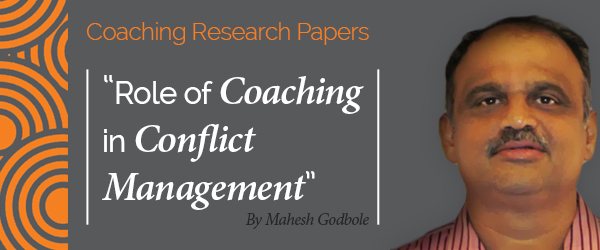Research Paper By Mahesh Godbole
(Executive Coach, INDIA)
This article provides thought for the reader on how can the skills learned in Coaching be applied for resolving conflict in a group which is working towards a common objective, but has different perspectives and engagement drivers. The article also makes a case that the ICF competencies to coaching are an appropriate tool to deploy in conflict
Management situations.
A dictionary meaning of conflict is conflict: verb (used without object)
- to come into collision or disagreement; be contradictory, at variance, or in opposition; clash.
- to fight or contend; do battle.
Conflict by a common understanding denotes that there a divergence of ideas between 2 or more parties as to how they see moving forward. It means reaching cross roads .Managing conflict means resolving the disagreement and making choice on which path to take
A conflict can at times be also between oneself when choosing between alternatives is difficult, specially when one alternative needs to be jettisoned. We will not worry too much about this in the present context.
Here we are more interested in understanding conflict between 2 or more Individuals or groups and how coaching can help in addressing conflict.
In order to to do that let us look at what conflict actually means, what are points of origin and the manifestation of conflict as is seen
Conflict is a felt struggle between two or more interdependent individuals over perceived incompatible differences in beliefs, values, and goals, or over differences in desires for esteem, control, and connectedness. This definition emphasizes several unique aspects of conflict
(Wilmot & Hocker, 2011).
- Conflict is struggle :- It is the result of divergent forces coming together and the need of those divergent forces to stay together for a period of time, or for the purpose of completion of a task or an action
- Interdependence:- There needs to be interdependence of parties on each other. If the same is not required, the situation will not stand test of being called as a “conflict”. Indifferent parties, with even extreme views cannot have conflict as they seldom need to work together
- Differences:- In all types of conflict there are differences between parties that bring about a conflict. The differences can stem out of various origin points such as values and beliefs, needs and the role one needs to play
Further conflicts can be based on “Content” or “Relationships”
Some examples of Relationship conflict can be the ones arising out of
Issues of Esteem :
Stems out of the need to be respected and given space as one thinks his position demands. In Organisations it is driven more by power and Position . A superior can feel that he needs to be heard and respected at work. This at times gets carried in non work areas as well.
There is a need of control amongst all of us and the degree of control can vary from time to time and situation to situation. However, this degree of control when starts “trespassing” on others perceived territory conflict can result
Conflict at the Content Level:
This can be at two sublevels
Values and Beliefs:
While we come to work together in teams and are supposed to perform certain predetermined tasks, we also bring a long list of values and beliefs we carry and use those as a tool to judge others. If we were mechanical in our work life and had no history, (baggage) possibly conflict could have been less.
Goals and Objectives:
Many a time by design and in many organizations, goals for one group may and will conflict with goals of others. At a simple level one may see the goal of a Production Manager to have no down time and thereby wanting to have enough inventory and on the other level the role of a purchasing Manager is to keep as low inventory as possible. Is it possible that there will not be conflict every time they interact? On a more divergent level, there are various groups who work within the ecosystem of the Organisation who have clearly defined opposite views and positions on many things and yet need to work together.. Eg. The employee Unions and the Management.
The question I have attempted to answer is how will Coaching help in Managing and Resolving conflicts in general and what ICF Competencies can be useful in coaching a group with conflict Management issues..
